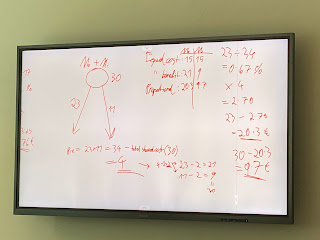World Politics Session 7 and Session 8
Today, we were introduced to a measurement called Worldwide Governance Indicators, which provides aggregate and individual governance indicators for over 200 countries and territories on six dimensions of governance from 1996 to 2020. The dimensions are: Voice and Accountability, Political Stability and Absence of Violence/Terrorism, Government Effectiveness, Regulatory Quality, Rule of Law, and Control of Corruption. These composite indicators are based on the responses of a significant number of business, citizen, and expert survey respondents from both developed and developing countries. They're based on more than 30 different data sources including survey institutions, think tanks, non-governmental organisations, international organisations, and private sector companies.
Then, after the break, we were introduced to the institutionalized international systems and how the growing number of unresolved policy issues require a new framework that helps cooperation without over-centralisation, keeping network resilience, promoting a global approach but still respecting national systems, incorporates inclusiveness, transparency, and accountability, and efficiency.
Then, we watched a video which happened during the World Economic Forum where the panel talked about their research found out that only 6% percent of the younger generation would want to join the political realm. We then discussed how we could approach it and bring in the young generation so they would be more interested in politics. Whether it is issues relating to their times, how politics of perceived, how mental health issues is viewed, and when people could run and stop running.
We understood that International Organisations (IO) are entities established by formal treaties/agreements and need to have at least three states as members, if not, it would just be a bilateral agreements. Their existence is recognised by the law in their member countries, but they are not treated as resident institutional units of the countries in which they are located. Their purpose can also shift from the policies or decisions that was made, supporting goals that are related.
WTO goals : is to help its members use trade as a means to raise living standards, create jobs and improve people's lives. As well as operates the global system of trade rules and helps developing countries build their trade capacity.
1. Providing information: gathering, analyzing, disseminating data about global trade and trade agreements
2. Providing a forum for exchange of views and learning (e.g. WTO academy)
3. Providing normative functions like the definition and the monitoring of standards of conduct or service
4. Rule-creating such as drafting legally binding treaties through conferences (Uruguay and Doha rounds)
5. Providing technical assistance to negotiate and to implement trade agreements
6. Providing dispute resolution services (here: trade conflicts)
• The WTO's top decision-making body is the Ministerial Conference, which meets every two years. All major decisions are made by the WTO's member governments
• Below this is the General Council and various other councils and committees, which are responsible for the daily activities.
The structure of the WTO is dominated by its highest authority, the Ministerial Conference, composed of representatives of all WTO members, which is required to meet at least every two years and which can take decisions on all matters under any of the multilateral trade agreements.
WTO – Specific Purpose
• The primary purpose of the WTO is to open trade for the benefit of all.
• The goal is to ensure that trade flows as smoothly, predictably and freely as possible.
• The WTO is the only global international organization dealing with the rules of trade between nations.
• At its heart are the WTO agreements, negotiated and signed by the bulk of the world’s trading nations and ratified in their parliaments.
WTO – Functions
• Administering WTO trade agreements
• Forum for trade negotiations
• Handling trade disputes
• Monitoring national trade policies
• Technical assistance and training for developing countries
• Cooperation with other international organisations
• The WTO was established by formal political agreements between their members that have the status of international treaties.
• The WTO is an intergovernmental organization, because its members are nations.
• The WTO is financed by fees of its members.
• The WTO is governed by the ministerial conference (decision- making body) and the general counsel (management board for daily business).
• The WTO has a global focus.
• The WTO has a specific purpose.

Comments
Post a Comment